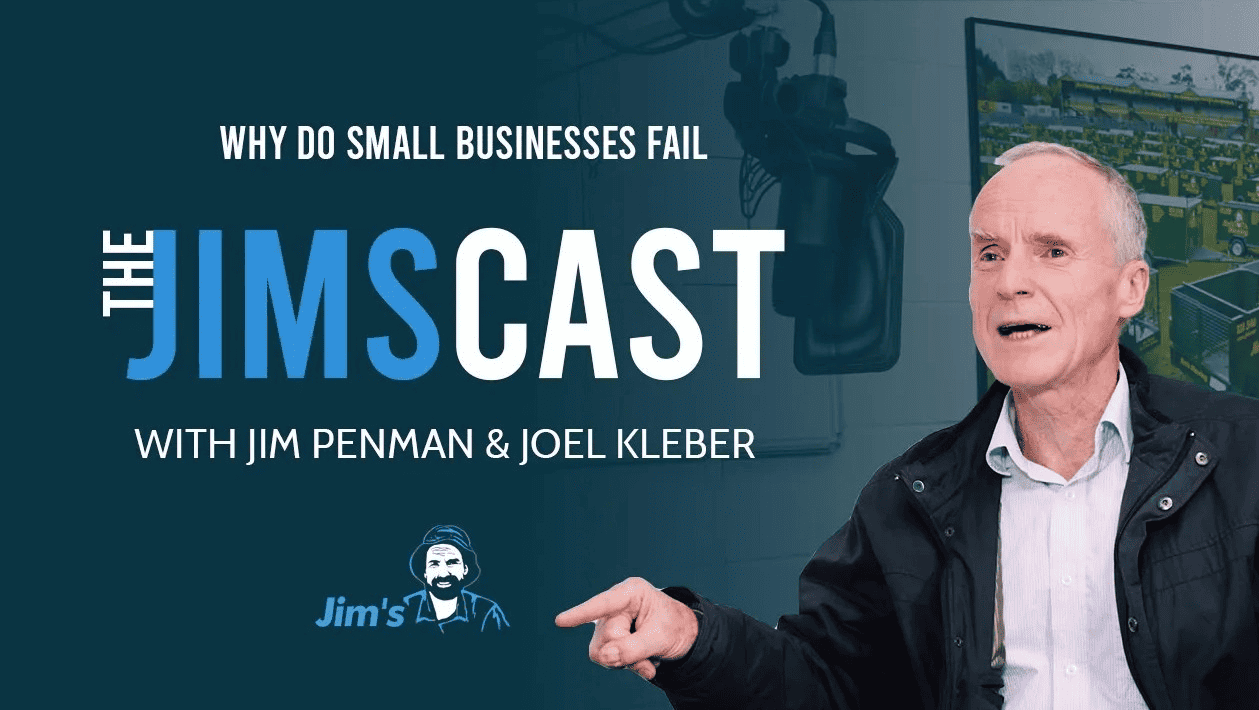This is taken from the Jim’s Group Podcast which I created to give Jim’s Group CEO, Jim Penman a platform to share his decades of business knowledge.
The great thing about this, it’s a soft sell and also an easy way to create content at scale.
We have had many people discover us and form a connection with our franchise brand via completely out there topics such as religion for example as the content that has brought them into our franchising family.
Here are Jim’s 7 reasons why small businesses fail from the podcast interview which was generated using Chat GPT and a plugin called video insights, if you want to learn how to use it, sign-up for my newsletter below. It’s a great way to re-purpose your original videos from your transcripts and have content created for your website quite easily.
Difficulty in Finding Customers
One of the primary reasons small businesses fail, according to Penman, is the difficulty in finding customers and establishing goodwill. A business without a solid customer base struggles to generate revenue and sustain its operations. This challenge is particularly acute for new businesses that lack brand recognition and a proven track record.
To overcome this hurdle, businesses need to invest in marketing and customer acquisition strategies. This could involve traditional advertising methods, digital marketing, or even word-of-mouth referrals. It’s also crucial for businesses to understand their target market and tailor their offerings to meet the needs and preferences of this group.
Inadequate Advertising and Customer Service
Penman emphasizes the importance of learning how to effectively advertise and look after customers. Businesses that fail to master these aspects often struggle to attract and retain customers. Advertising is not just about promoting a product or service; it’s about communicating a value proposition and convincing potential customers that your offering meets their needs better than the alternatives.
Similarly, customer service is not just about resolving issues or answering queries; it’s about building relationships with customers and ensuring their satisfaction. Businesses that provide excellent customer service can generate repeat business, positive reviews, and referrals, all of which can contribute to their success.
Lack of Expertise
Many small businesses fail because they lack the necessary expertise to perform their job effectively, according to Penman. This is particularly true for franchises, where franchisees need to be proficient in both the technical and business aspects of their operation.
For instance, a franchisee running a fast-food outlet needs to know how to prepare the food, manage inventory, maintain hygiene standards, and ensure customer satisfaction. At the same time, they also need to understand how to manage finances, comply with regulations, hire and train staff, and promote their business.
Inadequate Regulatory Framework
Penman criticizes the franchising code of conduct for being frustrating and inadequate. He suggests that a lack of effective regulation can lead to unfair practices that harm small businesses. For instance, some franchisors may impose unreasonable demands on their franchisees or fail to provide the necessary support.
To address this issue, Penman proposes that the government should take a greater role in regulating the franchising industry. This could involve setting minimum standards for franchisor support, providing dispute resolution mechanisms, and ensuring transparency in franchise agreements.
Lack of Control Over Business Operations
According to Penman, franchisees should have more control over their business operations. He proposes giving franchisees a veto over changes to their own manuals and an automatic right of renewal at the end of a franchise. This would give franchisees more certainty and allow them to plan for the long term.
However, it’s also important for franchisees to understand that with control comes responsibility. They need to be proactive in managing their business and making decisions that align with their goals and the expectations of their customers.
Questionable Marketing Tactics
Penman warns about the dangers of franchise opportunities or businesses that use questionable marketing tactics. He advises potential business owners to exercise caution and conduct thorough research before investing in a franchise or business opportunity.
For instance, some businesses may promise high returns with little effort, use high-pressure sales tactics, or fail to discloseimportant information about the business. It’s crucial for potential business owners to verify the claims made by the business, understand the terms of the agreement, and consider seeking independent advice before making a decision.
Failure to Leverage the Benefits of Franchising
Penman emphasizes that franchising offers many benefits, including ongoing training and expertise. Businesses that fail to leverage these benefits often struggle to succeed.
Franchising provides a proven business model, brand recognition, and support in areas such as training, marketing, and supply chain management. These benefits can significantly reduce the risks and challenges associated with starting a business from scratch.
However, it’s also important for franchisees to understand that franchising is not a guarantee of success. They still need to put in the effort to manage their business effectively, provide excellent customer service, and adapt to changes in the market.
Conclusion
In conclusion, understanding why small businesses fail can help entrepreneurs avoid these pitfalls and increase their chances of success. As Penman’s insights show, success in business requires a combination of expertise, effective marketing and customer service, regulatory support, and the ability to leverage available resources and opportunities.
While the challenges of running a small business can be daunting, they are not insurmountable. With the right approach, resources, and determination, entrepreneurs can overcome these challenges and build successful businesses.
Remember, failure is not the end of the journey, but a stepping stone to success. It provides valuable lessons that can guide future decisions and strategies. As the saying goes, “Failure is simply the opportunity to begin again, this time more intelligently.”


0 comments